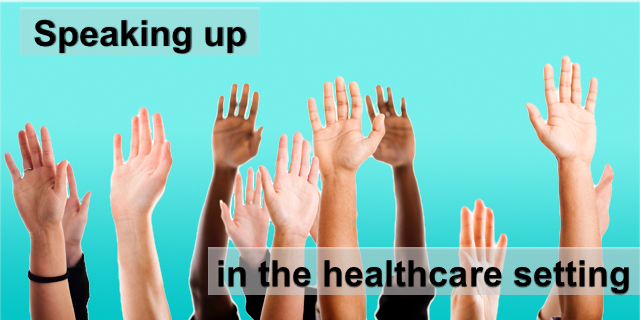Recently researchers added a question to a common survey that patients can complete after they are discharged from the hospital. The question – “How often did you feel comfortable speaking up if you had any problems in your care?” available answers included: “(1) no problems during hospitalization, (2) always felt comfortable speaking up and (3) usually/sometimes/never felt comfortable speaking up”- was added to the Hospital Consumer Assessment of Healthcare Providers and Systems survey. Over 10,000 patients completed the survey and of those almost half (48.6 percent) indicated they had experienced a problem during hospitalization and 30 percent said they had trouble speaking up about it.
The patients who felt uncomfortable speaking up were also ones who gave nurses and physicians lower ratings on communication as well as lower ratings to the hospital overall and were less likely to recommend the hospital than those who answered that they were always comfortable speaking up.
An editorial accompanying this research article pointed out a key limitation of this research, “Speaking up about confusing medications or care instructions is not the same as recognising and communicating about patient deterioration, calling out a perceived medical error or speaking up about disrespectful treatment—each distinct problems, with different barriers and motivators.”
Personal Experience
I agree with this editorial statement. I have had two experiences (at the same hospital) demonstrating a couple of issues around speaking up. In one situation, I did not understand a problem that was occurring in a loved one because I didn’t have the knowledge or background to recognize it and speak up. In the other case, speaking up about a lack of nursing care that caused a pressure ulcer on a family member, resulted in even less care for my loved one. In that case, I was a “trouble-maker” and by association, so was the patient.
I have also witnessed the ageism that occurs in the healthcare setting: people who are elderly may be ignored or discounted–after all, “aches and pains” are part of “aging” and should be “expected.” Research has shown that older age, worse physical or mental health or being a non-English speaker, negatively impact the interest in or ability to speak up about problems. Also, fear of being seen as a trouble-maker adds to reluctance to speak up.
As the editorial points out, about what and to whom, when, where and how patients speak up matters. It is easier to speak up about something later on than to the care team in real time. It is difficult to speak up without emotion when you are the loved one of someone who is suffering. These are but a few of the barriers to patients and caregivers voicing their concerns.
Speaking to someone who listens and acts
Helping patients speak up is important but equally important is getting the healthcare community to listen to patients and caregivers and act on their recommendations without repercussions on the patient or their loved ones. It is a tall order in a healthcare system that is run “on the clock” with nurses and physicians stretched by cost-containment and time-constraints.
Have you had an experience in the hospital or other healthcare setting where you could tell that something was wrong but had difficulty speaking up? Have you ever been labeled a troublemaker for speaking up? Have you not known when or how to speak up? Have you come up with strategies to help you speak up? Please share your experiences in the comments below.






I spoke up about having surgery I was never told about. Woke up with an ostomy and an intense desire to die. Got labelled crazy and they claimed I had a fictitious sexually transmitted disease.
Several yrs ago an RN did a flexible-tube rectal exam, 2nd in my decades of life but first with him, and he shoved it with surprising force and speed through the resistance of a 2nd bend, causing me pain and real alarm, fear of perforation. The previous exam years ago (again, a different tech) used steady, smooth, easy pushing, and made minimal discomfort to get ’round the bend, and only one bend. The attitude of the latest exam tech seemed brusque and not open to feedback, and I am reluctant to confront staff face to face. Some time later I did tell my MD, results unknown.